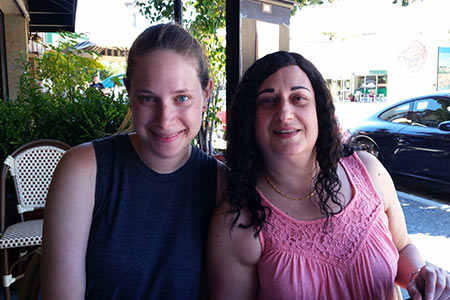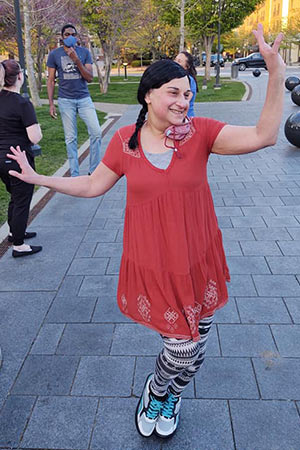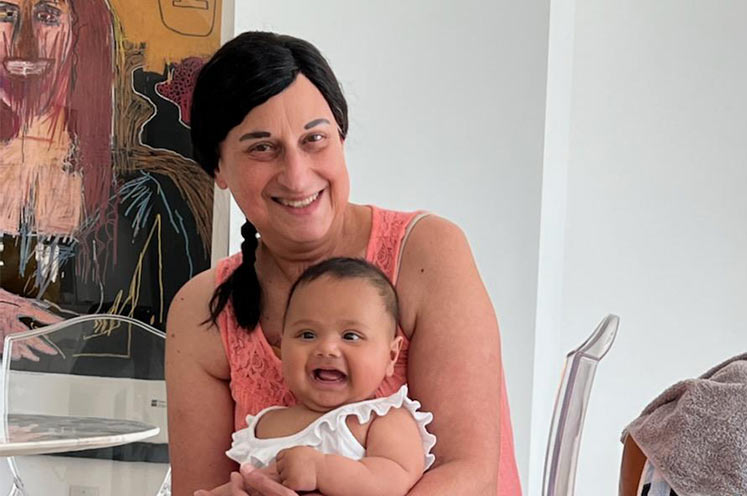Treating life-threatening cancer
“Squamous cell carcinoma of the head and neck can be aggressive and life-threatening,” says Dr. Siddiqui. “At Henry Ford, we always work with a multi-disciplinary team and all cases are discussed in a tumor board prior to starting therapy to carefully weigh the risk-benefit ratio and arrive at a consensus for any treatment we offer patients. It is critically important to discuss the various treatment options including robotic surgery and radiation. Walking patients through the thought processes that leads to the final treatment recommendations encourages shared decision-making between patients and providers.”
For locally advanced head and neck cancers such as Tessa’s, radiation therapy was offered as the treatment of choice despite the side effects. Radiation treatment involves high-energy x-rays that damage the DNA of tumor cells, causing them to die, but normal tissues near the tumor can heal later.
In addition to meeting a medical oncologist and radiation oncologist, Tessa consulted with supportive oncology staff, including a speech-language pathologist to assist with any swallowing difficulties. She also met a dietitian to optimize her nutrition, and she was referred to our team oncology psychologist to discuss coping mechanisms. The multidisciplinary tumor board met regularly to update the providers about their treatments for Tessa.
As a curative treatment for Tessa’s throat cancer, radiation therapy was used every weekday for seven weeks and chemotherapy once a week. For Tessa, the side effects were minimal: Just a little nausea from the chemotherapy and a little sunburn from the radiation.
The most surprising part of the treatment was the radiotherapy mask or head shell. During radiation treatments, the customized immobilization device precisely positions patients and temporarily restricts movement. “It was a little scary, but I only wore it for a few minutes at a time, and I got used to it,” says Tessa.
Coping with late side effects
In the last two weeks of treatment, the side effects of radiation occurred. “I couldn’t eat, and I lost 30 pounds. Generally, I’m a positive person. But I was a little depressed at that time,” says Tessa.
Hospitalized, Tessa had a nasal feeding tube, but it irritated her throat. A different feeding tube could have been placed through her stomach, but physicians did not want Tessa to undergo the required surgery. She had one choice, and it seemed impossible: Try to eat.
Dignity and self-worth
 That’s when she was motivated by the language of dignity. “Dr. Siddiqui helped me so much by saying ‘You’ve got to help yourself. You have to meet me halfway,’” says Tessa. “He told me that if I didn’t start eating, my organs would fail, and he couldn’t help me. He is a very caring and amazing person. I connected very well with him. He’s incredible.”
That’s when she was motivated by the language of dignity. “Dr. Siddiqui helped me so much by saying ‘You’ve got to help yourself. You have to meet me halfway,’” says Tessa. “He told me that if I didn’t start eating, my organs would fail, and he couldn’t help me. He is a very caring and amazing person. I connected very well with him. He’s incredible.”
“I slowly, slowly started to eat a few eggs and soft foods each day,” says Tessa. Soon after she regained some energy, she went back to studying languages.
“Most side effects improve with time,” says Dr. Siddiqui. “Our proactive team approach has been shown to help maintain the patient’s quality of life and provide the best outcomes, especially in complex cases.”
Connecting with empathy
“Dr. Siddiqui and his team were very empathetic, very helpful,” says Tessa. Also, a special bond was created when Tessa spoke Turkish to an attentive Syrian nurse, Lamis Fakhoury.
Physical therapist Kari Busch addressed another side effect from radiation. She used her “magical fingers” to reduce the swelling in Tessa’s neck. “She showed me ways to continue to move the flow from the lymph nodes and decrease the swelling,” says Tessa.
“After treatment, patients can enjoy most of the things they did prior to the cancer diagnosis, and they can have a reasonably good quality of life,” says Dr. Siddiqui.
Family and community support
At Tessa’s home, she received help from her daughter and daughter’s family who stayed with her for three months during Covid. Neighbors, friends, and dancers from her salsa community brought food.
“Getting involved in the salsa community introduced me to so many people and different cultures. I guess that’s how I just kept going through this,” says Tessa who works as an administrator for an IT company.
Tessa’s advice? “If you have a positive attitude, there seems to be a light at the end of the tunnel – no matter how difficult the situation is that you’re going through.”
Her future plans? Stay healthy and enjoy family and friends. Stay fit, dance and keep learning languages.
.svg?iar=0&hash=F6049510E33E4E6D8196C26CCC0A64A4)

/hfh-logo-main--white.svg?iar=0&hash=ED491CBFADFB7670FAE94559C98D7798)


